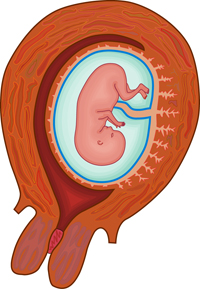
What is Gestational Diabetes and what does it mean to my unborn baby?
Polycystic Ovarian Syndrome (PCOS) is a common cause of female infertility because it causes many types of menstrual irregularities, including the absence of a period.4 If you don’t ovulate or this process is impaired, then pregnancy is unlikely. So treating PCOS symptoms and addressing a condition called Insulin Resistance, which influences PCOS, is very important for women wishing to conceive.4 If a woman does conceive in spite of Polycystic Ovarian Syndrome it is not all smooth sailing. Unfortunately, there will be a new series of health issues concerning PCOS and pregnancy.3 Women with PCOS have a higher risk of several pregnancy problems, including gestational diabetes, miscarriage, premature delivery, pregnancy-induced hypertension, and babies with high birth weight.8 It is crucial for women with PCOS to work closely with their obstetrician during pregnancy to minimize the risk of these problems.
What is gestational diabetes?
Gestational diabetes happens when a pregnant woman’s body has an impaired ability to process glucose. This results in high blood glucose levels that can cause serious complications for the woman and her growing baby.9 During pregnancy elevated blood sugar can be passed to the baby through the placenta producing a larger baby with potentially immature lungs. A large baby also means a more dangerous birth for both mother and child. Gestational diabetes affects about seven percent of all pregnancies and usually develops after the 20th week.5
Since gestational diabetes can be the cause of serious complications for both mother and baby, it is crucial to be under an obstetrician’s care, especially if you have PCOS or present with any other risk factors. Since PCOS in itself causes high glucose levels, many doctors recommend pregnant women with PCOS get early screening for gestational diabetes before the 20th week.3 If you develop gestational diabetes your obstetrician will probably suggest that you monitor your own blood sugar several times a day, such as after every meal and right after you get up in the morning. Careful monitoring of both mother and child is the key to controlling the negative impact of this condition, as is following the recommended treatment plan to the letter. Most treatment plans for gestational diabetes will revolve around regulating blood sugar levels and will likely include diet considerations 2, regular exercise, and natural therapies or medication.
+ Click here to learn about the all natural PCOS 5-Element Solution
+ Click here to read more articles about PCOS and Pregnancy
Causes
Does PCOS Increase My Risk of Gestational Diabetes?
While it is a fact that women with Polycystic Ovarian Syndrome have a higher risk of developing gestational diabetes during pregnancy, is your PCOS the only cause of this condition? PCOS and pregnancy create the perfect storm for gestational diabetes because many women with PCOS are insulin resistant and being pregnant increases glucose intolerance in the body.9
Women who don’t have PCOS also develop gestational diabetes, which makes it logical to assume that other causes and factors might come into play. The processes that occur during a normal pregnancy can also raise blood sugar without any influencing factors. During pregnancy, your baby is connected to your blood supply through the placenta, which produces hormones that can impair the way insulin interacts with your cells. This can raise your blood sugar. As your pregnancy progresses the placenta puts out an increasing volume of insulin-blocking hormones, which can in the later trimesters develop into gestational diabetes.5 A few extra risks and factors can tip the blood sugar see-saw of pregnancy onto the gestational diabetes side even without considering PCOS.
Other factors and conditions that can increase the risk of gestational diabetes beyond Polycystic Ovarian Syndrome or rising blood sugar are:9
- Age: Women older than age 25
- Personal history: your risk of gestational diabetes is higher if you had gestational diabetes in a previous pregnancy or had a baby over nine pounds
- A prediabetic condition before pregnancy
- Obesity: women with a body mass index of 30 or higher
- Ethnicity: Asian, black, American Indian, or Hispanic women have a greater risk of gestational diabetes
- Family history: Your risk of gestational diabetes increases if a close family member has Type 2 diabetes
If you do develop gestational diabetes during pregnancy due to PCOS or other risk factors, you can experience other complications beyond those stemming from Insulin Resistance and a rise in blood sugar.

Complications that can affect you if you develop gestational diabetes are:2
- High blood pressure:? This condition can develop during pregnancy especially if you have PCOS. Women with PCOS have a higher risk for pregnancy-induced hypertension.
- preeclampsia and eclampsia:? These are very serious conditions that can threaten the lives of both the mother and baby. They are characterized by high blood pressure, swelling in the extremities, and in severe cases seizures.
- Gestational diabetes:? Gestational diabetes resolves itself when the baby is born but once you have had this condition you are at higher risk of having it again in future pregnancies.
- Type 2 diabetes:? If you experience gestational diabetes your risk for developing Type 2 diabetes later in life is higher. PCOS can also increase this risk because Insulin Resistance plays a role in both PCOS and diabetes. A proactive approach involving healthy life choices such as following a balanced diet and exercising daily following the birth can be instrumental to prevent the development of diabetes.
- More severe PCOS symptoms:? Women who have gestational diabetes often gain more weight during their pregnancies, which has a negative effect on their Polycystic Ovarian Syndrome after the birth.
What effect does gestational diabetes have on the baby?
Most women with gestational diabetes and PCOS have perfectly healthy babies despite potential pregnancy problems. However, complications of gestational diabetes can be passed on to your baby if you don’t manage the condition while you are pregnant.
Issues that can affect your baby are:
- Excessive birth weight (macrosomia):? Your baby might grow too large if the extra glucose in your bloodstream passes through the placenta. The baby’s pancreas will make extra insulin, thus triggering the growth. This is a concern for both mother and child because a C-section might have to be performed and the baby could end up with injuries associated with its birth or become stuck in the birth canal.5
 Hypoglycemia:? Babies born to women with gestational diabetes can develop low blood sugar after the birth which in turn can cause seizures. An IV of glucose solution is often administered to these babies to normalize the blood sugar level.5
Hypoglycemia:? Babies born to women with gestational diabetes can develop low blood sugar after the birth which in turn can cause seizures. An IV of glucose solution is often administered to these babies to normalize the blood sugar level.5- Preterm birth:? Because premature labor is a risk when a mother has gestational diabetes, sometimes an early delivery is induced when the baby is growing too large.
- Respiratory distress syndrome:? Babies with this condition have immature lungs that require assistance to breath effectively. Sometimes respiratory distress syndrome is the result of an early delivery but it also can be linked to a mother with gestational diabetes.
- Jaundice:? When the liver is unable to break down bilirubin a yellowish cast to the skin and the whites of the eyes can occur. This condition is not serious but it does need to be treated.
- Type 2 diabetes:? This complication can occur later in life.
When gestational diabetes is left untreated it can cause serious harm to the baby either before or soon after birth.
Symptoms
Women with PCOS are at Greater Risk of Developing Gestational Diabetes
 Women with PCOS are at greater risk of developing gestational diabetes because both conditions are associated with Insulin Resistance.7 Obviously it is important to definitively diagnose PCOS before becoming pregnant in order to act proactively to prevent gestational diabetes. The markers of Polycystic Ovarian Syndrome are quite diverse, so doctors often need to consider a range of symptoms before making a conclusion.
Women with PCOS are at greater risk of developing gestational diabetes because both conditions are associated with Insulin Resistance.7 Obviously it is important to definitively diagnose PCOS before becoming pregnant in order to act proactively to prevent gestational diabetes. The markers of Polycystic Ovarian Syndrome are quite diverse, so doctors often need to consider a range of symptoms before making a conclusion.
The most common signs and symptoms of PCOS are:3
- Painful menstrual cycles
- Absent periods
- Irregular periods
- Heavy or prolonged bleeding
- Infertility
- Excessive hair growth
- Darker patches of skin
- Male pattern baldness
- Acne
- Obesity
If you have PCOS you might be screened earlier in your pregnancy for gestational diabetes, perhaps around the 20th week.3 PCOS also has levels of severity with its symptoms. It has been found that women who have Polycystic Ovarian Syndrome and are also obese or have hyperinsulinemia increase their risk of gestational diabetes as well. All pregnant women are screened with routine blood sugar tests at 24 to 28 weeks but catching gestational diabetes early is often the key to treating it effectively, so higher risk (PCOS) means an advance test. Beyond these tests there really aren’t any overt signs you can watch for concerning gestational diabetes, so it is usually picked up during your regular prenatal visits.
Possible symptoms of gestational diabetes you can look for during your pregnancy can include:9
- Nausea and vomiting
- Blurred vision
- Increased urination
- Excessive thirst
- Infections
Treatment Options
What if Natural Methods Aren’t Working?
If natural therapies do not make a positive impact on your blood sugar you might need to take medication that will help with your gestational diabetes. Metformin is the usual choice for most doctors, and  women with PCOS are often already on this medication to control the symptoms associated with that condition and to address Insulin Resistance.
women with PCOS are often already on this medication to control the symptoms associated with that condition and to address Insulin Resistance.
Metformin is a drug used by Type-2 diabetics and women with Polycystic Ovarian Syndrome because it reduces Insulin Resistance and insulin secretion. It can help prevent gestational diabetes and reduce the prevalence of preeclampsia, preterm labor, macrosomia, and the risk of miscarriage. Metformin can also help control pregnancy weight gain and lower male hormone levels.6
What should you expect if you have gestational diabetes?
If you have been diagnosed with gestational diabetes your doctor will closely monitor your baby’s development and growth. Large babies are a risk for women with gestational diabetes and this can cause complications both during and after the birth for both mother and child. You should be aware that if your baby is projected to have a high birth weight and you sail past your due date with no overt signs of labor, then your doctor will usually induce labor or perform a C-section.
The best course of action in the fight against gestational diabetes is to get great prenatal care (and early!) and have regular prenatal visits. You should also follow your doctor’s recommendations regarding medication and natural therapies.
Natural Therapies
Are Natural Therapies Effective for Managing PCOS and Lowering Your Risk?
Are natural treatments effective for managing PCOS and lowering your risk of gestational diabetes? When you have pregnancy problems it feels right to consider natural remedies because you never want to pollute your body with anything that might harm your baby. PCOS and pregnancy combined often create conditions like gestational diabetes which might require medical intervention of some type so it is important to discuss all treatment options carefully with your doctor. Some possible suggestions from your physician might include adjusting your diet to be more PCOS and diabetes friendly, exercising daily, and taking certain targeted nutritional supplements that can have a positive impact on gestational diabetes.
Diet
 Diet is a crucial component in the treatment of Polycystic Ovarian Syndrome before, during, and after pregnancy and should be a key consideration to prevent and manage gestational diabetes. It is a fact that women who have PCOS are at a higher risk for pregnancy problems in general, as well as gestational diabetes specifically. So it makes sense to proactively tailor your diet throughout your pregnancy like you already have a diagnosis of gestational diabetes. A balanced junk-free diet will also help control the weight gain that can lessen PCOS symptoms.2
Diet is a crucial component in the treatment of Polycystic Ovarian Syndrome before, during, and after pregnancy and should be a key consideration to prevent and manage gestational diabetes. It is a fact that women who have PCOS are at a higher risk for pregnancy problems in general, as well as gestational diabetes specifically. So it makes sense to proactively tailor your diet throughout your pregnancy like you already have a diagnosis of gestational diabetes. A balanced junk-free diet will also help control the weight gain that can lessen PCOS symptoms.2
What is the best diet for PCOS and gestational diabetes?
Your food choices can still be delicious and satisfying after developing gestational diabetes during your pregnancy. A delectable assortment of lean proteins, fruit, vegetables, and whole grains are still available despite pregnancy problems. You are only limited by your culinary skill, and you probably already have a repertoire of wonderful diabetes-friendly recipes at your fingertips if you use diet to treat your insulin sensitivity and PCOS symptoms. Unfortunately, many women who have been diagnosed with gestational diabetes believe they have to actively avoid any type of carbohydrate to control their condition. This is not true and can be detrimental because high fiber and whole-grain carbohydrates have many vitamins and nutrients important to both mother and growing baby.2 Consuming these kinds of carbohydrates also helps control glucose and lessens the influence of insulin sensitivity. A slight reduction of carbohydrate intake might be recommended if your condition is severe, but don’t make any major changes until you discuss it with your doctor. .
It is important to spread your carbohydrate consumption equally across the whole day-from a nutritional breakfast to a satisfying snack before bed. This will help keep your glucose levels even throughout the night.8 You should also combine your carbohydrates with a lean protein source each meal (including snacks) because this practice will stabilize your glucose levels. You might experience cravings during your pregnancy for sugary foods but you must have the willpower to resist binging. Desserts, candy, soft drinks, and even too much fruit juice will adversely impact your efforts to manage both PCOS and gestational diabetes.2
Exercise

This is a key component for dynamic health for women with Polycystic Ovarian Syndrome and should be a regular part of your routine during and after your pregnancy. Exercise is recommended for women with gestational diabetes to control it as well as for those women without issues as a preventative measure. Physical activity can actually increase the body’s sensitivity to sugar and reduce Insulin Resistance. Post-meal exercise, such as walking even 15 minutes, helps manage blood pressure.8 It also helps alleviate some of the discomfort associated with pregnancy such as cramps, back pain, swelling, and trouble sleeping. If you already have a favorite exercise regime to control your PCOS symptoms, then continue it at a slightly less intense level, and if you have been a bit of a couch potato before your pregnancy then try to find an activity you enjoy that gets you moving. Most doctors will recommend gentler activities such as yoga, walking, swimming, and cycling for previously inactive women. The goal is better health and managing both PCOS and gestational diabetes, not to compete in a triathlon!
Nutritional Supplements
Most women will be taking a prenatal multivitamin while pregnant to fill in the nutritional gaps that occur when diet falls a little short. This is a great proactive approach that can also be bolstered by a few targeted additions to the supplement routine. Although PCOS and infertility are often treated using natural products like Chaste Berry and Yarrow, these botanicals cannot be taken during pregnancy so it is important to discontinue them until your doctor indicates it is safe again, usually after breast feeding is complete. Some safe choices to help manage gestational diabetes are:
- Vitamin D:? Supplementing this vitamin might lower the risk of developing gestational
 diabetes because low levels of vitamin D have been found in women who had gestational diabetes. The connection is not totally clear yet but a proactive approach may be advised.9
diabetes because low levels of vitamin D have been found in women who had gestational diabetes. The connection is not totally clear yet but a proactive approach may be advised.9 - Vitamin C:? Several studies have indicated that women who have been diagnosed with gestational diabetes often have low vitamin C levels. Supplementing this vitamin might posibively affect pregnant women and lower their risk of developing gestational diabetes.9
- Astragalus:? This botanical is often used together with insulin to improve blood sugar control. Women showed more positive results with this combination than women who only received insulin.
It is very important to discuss taking nutritional supplements with your doctor before taking them because some botanical ingredients can have unexpected effects and can adversely impact other medications.
Next Steps
- Take the PCOS Quiz! Get your score and assess your hormone health risks.
- Join our Facebook Sisterhood Group Pose your questions to this group of like-minded women. Get the answers to your questions and the support you need.
- Checkout the Hormone Reset. Guided Practices to eliminate anxiety, lose weight and boost energy.
We are committed to helping women reverse their symptoms of hormone imbalance – a major cause of excess weight gain, adult acne, unwanted facial hair, depression, anxiety, and heartbreaking female infertility.
©Insulite Health empowers women with hormone imbalance to transform their lives through a process of healing with the Natural Hormone Solution –a complete solution for helping women reverse the symptoms hormone imbalance..
